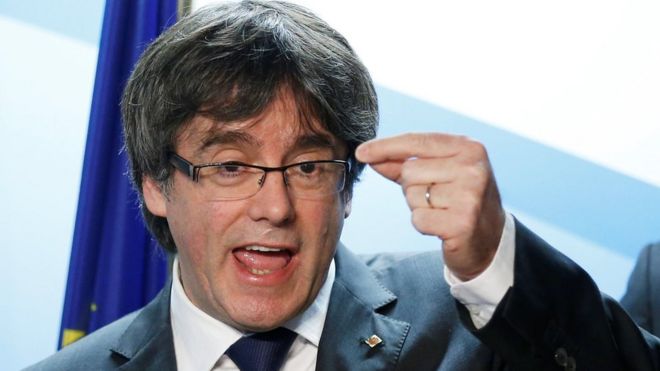 REUTERS
REUTERS
Catalonia's ousted separatist leader, Carles Puigdemont, has called for new talks with Spain following a snap regional election.
He said he wanted them to take place in Brussels, where he is living in self-imposed exile, or another EU country.
He earlier declared that the Spanish state had been defeated in the Catalonia polls, as separatist parties still hold a slim, reduced majority.
The Spanish government is meeting to discussing its next steps.
"Catalonia wants to be an independent state. This is the wish of the Catalan people," said Mr Puigdemont, speaking in Belgium. "I think the plan of [Spanish Prime Minister] Mariano Rajoy is not working, so we have to find new ways to tackle this crisis."
It is unclear who will be given the right to form a government in Catalonia.
- Analysis: Catalan political landscape as divided as ever
- Catalonia crisis in 300 words
- Will Catalan independence happen?
Mr Rajoy had hoped the poll would restore stability but instead Spain's political turmoil looks set to continue. His conservative Popular Party (PP) recorded its worst ever result in Thursday's vote.
However, the Citizens party, which wants Catalonia to remain a semi-autonomous part of Spain, is the region's biggest party.
The Spanish government imposed direct rule on Catalonia and called the election after declaring an October independence referendum illegal.
Mr Puigdemont has also called on the prime minister to repatriate all the police sent to Catalonia before the referendum.
What were the results?
With nearly all votes counted, the pro-independence parties Together for Catalonia (JxCat), Republican Left of Catalonia (ERC) and Popular Unity (CUP) were on course to win a total of 70 seats in total, giving them a majority in the new parliament.
Citizens (Cs) had 25.3% of the vote, winning 37 seats in the 135-seat chamber.
Its leader Inés Arrimadas told the BBC her party had been "victorious". She said forming a coalition would be "difficult - but we will try".
The PP, meanwhile, won only three seats, down from 11 in the previous assembly.
Turnout was more than 80%, a record for a Catalan regional election.

Analysis: What the papers say
By BBC Monitoring
Madrid-based media say that the result has strengthened the government's position.
"Major forces supporting independence should look back, confess to mistakes and avoid making them again," La Vanguardia writes. "Nationalism can no longer claim that it exclusively represents Catalonia," La Razón says.
ABC newspaper thinks Madrid should now settle the Catalan crisis. "If Spain wants to win this fight in the long-term and prevent Catalonia from leaving one day, it should draft a serious plan for strengthening the state."
And the result seems to have split Catalan papers between those who want the independence project to continue, and those who accept the realpolitik of the election result.
"The independence movement has humiliated the Spanish prime minister," El Nacional says. "The decisions that affect Catalonia are not made in Madrid."
But Barcelona's El Periódico says the result means a "divided Catalonia". "The election that Mariano Rajoy called has shown that Catalonia is firmly divided in two blocs and there is hardly any space for intermediaries."
Tags:
English
